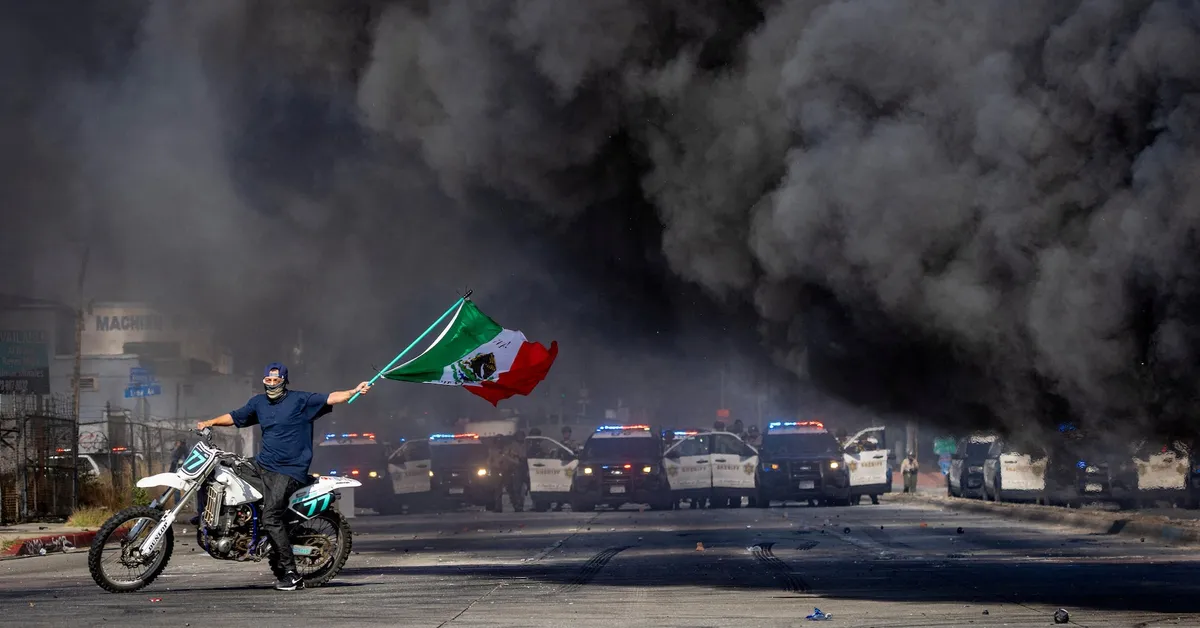
On June 8, 2023, the California National Guard was deployed in Los Angeles at the request of President Donald Trump, following two days of intense protests against recent immigration raids. These demonstrations were sparked by Trump's stringent immigration policies, which have faced criticism from various quarters. Footage captured on Sunday morning showed approximately a dozen National Guard members lining up at a federal building in downtown Los Angeles, a site where detainees from the raids were taken, igniting protests that continued into the weekend.
The protests began after U.S. Immigration and Customs Enforcement (ICE) conducted raids on Friday, resulting in the detention of at least 44 individuals. This prompted hundreds of demonstrators to gather in opposition to what they viewed as heavy-handed immigration enforcement. The protests were notably concentrated near Los Angeles City Hall, where another demonstration was scheduled for Sunday afternoon.
According to U.S. Northern Command, National Guard troops had already started deploying, with some troops seen in Paramount, southeast Los Angeles, near a Home Depot where altercations between protestors and police occurred the previous day. By noon local time on Sunday, a demonstration in Boyle Heights had attracted around 200 protestors, although no law enforcement personnel were present at that location.
In a post on his Truth Social platform, President Trump condemned the protests, labeling them as "Radical Left protests" instigated by "paid troublemakers." California Governor Gavin Newsom criticized Trump's deployment of the National Guard, suggesting that the president's actions were aimed at creating a spectacle rather than ensuring public safety. Video evidence from the scene indicated the presence of military-style vehicles and riot shields near the federal building, where the Department of Homeland Security reported around 1,000 protesters had gathered on Friday, though this figure could not be independently verified.
Reports from Reuters witnesses indicate that law enforcement faced off against protestors in both Paramount and downtown Los Angeles, with federal officers deploying gas canisters to disperse the crowds. In total, the Los Angeles Police Department arrested 27 individuals for failure to disperse during the downtown protest, while the Los Angeles County Sheriff's Department took three individuals into custody for allegedly assaulting an officer. Despite the tensions, some officials maintained a stance of "zero tolerance" for violence against federal agents.
The protests have highlighted a growing divide between the Democratic leadership in Los Angeles and Trump’s Republican administration, particularly regarding immigration policy. Defense Secretary Pete Hegseth warned that the Pentagon was prepared to mobilize active-duty troops if violence escalated, stating that Marines at nearby Camp Pendleton were on high alert. Meanwhile, Democratic Congresswoman Nanette Barragan, representing the area, criticized the decision to deploy the National Guard, asserting that local law enforcement had the necessary resources to handle the situation without federal intervention.
Secretary of Homeland Security Kristi Noem stated that the National Guard would ensure safety around buildings and assist law enforcement during peaceful protests. However, the legality of Trump's deployment was questioned, as it was unclear whether he had the authority to deploy the National Guard without Governor Newsom's order. Title 10 of the U.S. Code allows for federal deployment of the National Guard under certain conditions, but it also stipulates that such orders should typically come through state governors.
The ongoing situation in Los Angeles underscores the contentious nature of immigration enforcement in the United States, particularly as Trump aims to bolster his immigration crackdown. With the National Guard's presence and the potential for further military mobilization, the dynamics of local protests and federal responses are likely to evolve in the coming days. As the nation watches, the implications of these actions could reverberate well beyond Los Angeles, affecting immigration policy discussions nationwide.